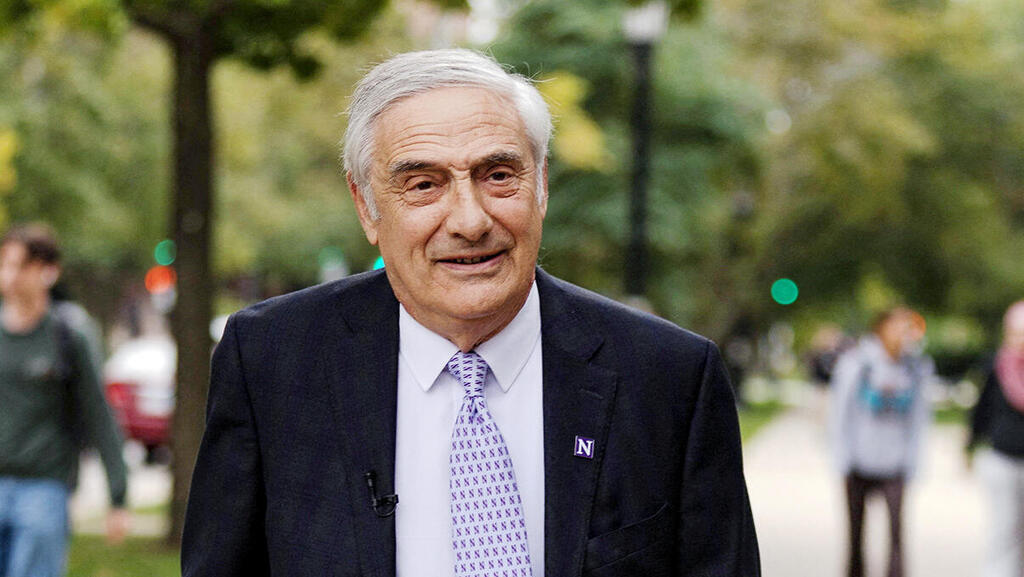
Nobel winner Joel Mokyr: “It’s not enough for technology to work, we must understand why”
The Israeli-American scholar on innovation, growth, and the human tendency to repeat old mistakes.
While Israelis were swept up in a wave of intense emotions surrounding the return of the hostages from Gaza, remembrance of the fallen, and the brief visit of U.S. President Donald Trump, Israeli-American Professor Joel Mokyr was experiencing a different kind of drama. On Monday, he received a phone call informing him that he had won the most prestigious award in the world – the Nobel Prize in Economics.
"I was completely shocked; I didn’t expect it at all. I had a long list of people who deserved to win. The Nobel Prize is wonderful material for academic gossip. I was completely shocked, but what can I say? I’ll take the money," Mokyr says in a conversation with Calcalist.
Mokyr cites another person he believes deserved to receive the Nobel Prize, also Israeli. "I’ve thought for years that the Nobel Prize should go to my friend Elhanan Helpman, who is the greatest of Israeli economists."
When I point out that there is another American with ties to Israel, President Donald Trump, who is only a month older than him and reportedly expected to receive the Nobel Peace Prize this year, Mokyr responds critically and with characteristic irony: "Maybe he deserves the Nobel Prize in Medicine for his insights into the connection between Tylenol and autism. But I don’t see things only from an Israeli perspective. I see the things he does, he holds grudges forever. I also think his contribution to the release of the hostages is smaller than it seems. After all, when Biden left the administration, we were already in a ceasefire. But I understand that he is very popular in Israel."
“It’s Not Enough for Technology to Work to Lead to Growth”
However, there is one point where Mokyr finds common ground with Trump, and he hopes the U.S. president will remain engaged in the Middle East. "He has the right intuition about war; he generally hates bloodshed. Although you don’t have to be a great genius to understand that war is stupid, I’m glad that Trump also hates wars. This is different from other Republicans, like Reagan and the two Bushes. He failed completely in Ukraine. In the Middle East, they’ve stopped shooting, and that’s wonderful, but I don’t know if it will last long in Gaza or in Judea and Samaria. I think President Trump has a very short attention span, so there’s reason to worry that as soon as he encounters difficulties on the road to an agreement, he’ll move on to something else."
Related articles:
Mokyr, 79, remains deeply interested in Israeli politics and current events. “My heart beats with joy that the hostages are back. My good feeling about the award is secondary. There’s nothing more important than returning hostages to their homeland. I wish all the families to recover from the trauma and that there will never again be kidnapped Israelis,” he says.
Mokyr has taught at Northwestern University in Illinois for over 50 years. He grew up in Israel and received his first academic education at the Hebrew University of Jerusalem. A historian and economist, he holds full appointments in both the history and economics departments.
Although he has lived abroad for decades, he still defines himself as “Israeli.” “I have an Israeli passport; an Israeli heart beats in me, and this award also says something about Israel.” Mokyr also teaches at Tel Aviv University. “I don’t have to participate in department meetings, but it’s an honorary appointment, and I teach a mini-course there every year. It’s an excellent economics department. They’ll take some of the credit for the award, and they certainly deserve some of it.”
In the Israeli context, it’s worth noting that Prof. Mokyr was among the economists who signed the letters warning of the economic consequences of the judicial reform the government began promoting in 2023.
Prof. Mokyr will receive half of the award for winning the Nobel, with the other half shared by Professors Philippe Aghion and Peter Howitt. The Nobel Committee defined his contribution in a single sentence: “For having identified the prerequisites for sustained growth through technological progress.”
Mokyr’s theory, for which he received the prize, centers on understanding why technology drives growth. “For technology to lead to growth, it’s not enough for it to work,” he explains. “We need to understand scientifically why technology works. In the inventions that preceded the technological revolution, there were no such explanations. Without scientific understanding, it’s very difficult to replicate innovation.”
He further emphasized in his research that for innovation to take root and sustain cycles of growth, “society must be open to new ideas and allow change.”
Mokyr is also known as a gifted teacher. He has supervised around 40 doctoral students, and his relationships with them are known to be close and ongoing.
“We Failed to Teach Ourselves to Avoid Wars”
Mokyr belongs to the academic discipline known as economic history. For many years, economic historians rarely received Nobel Prizes. The first in this field went to Douglas North and Robert Fogel in 1993. Yet, Mokyr notes that in recent years, economic historians have gained greater recognition. “Claudia Goldin is an economic historian through and through, and she received the prize, although not for work in history. In contrast, the Nobel Prize awarded last year to Daron Acemoglu, for his research on the importance of institutions, was truly a prize for economic history.”
Like many economic historians, Mokyr is seen as an optimist. In a 2014 interview with Calcalist, he said: “As a historian, my job is to say, ‘Yes, the world we live in is truly a mess, but in the past, it was worse in every measurable way.’” Even then, he tempered his optimism, warning: “From a political-institutional perspective, I see very dark clouds.”
In another interview with Calcalist during the “Swords of Iron” war in January 2024, Mokyr put it more bluntly: “The problem is that with technological progress, institutional progress has not followed. We have failed to teach ourselves how to avoid wars.” He added: “In the 20th century, it took countries 10 to 15 years to recover from a war. Almost every war leads to a rapid increase in national debt, and then you pay for it.”
